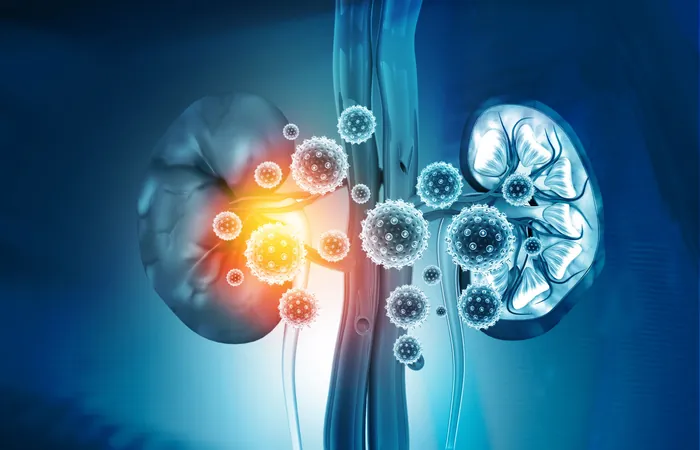
Could Your Gut Be Key to Preventing Alzheimer's and Parkinson's?
2025-09-02
Author: Michael
A Groundbreaking Study Links Gut Health to Neurodegenerative Diseases
Imagine knowing you could predict Alzheimer's or Parkinson's disease years before symptoms even show. A new study has brilliant insights that suggest health issues related to your gut could be the answer!
Unlocking the Mystery of Alzheimer's and Parkinson's
Parkinson's and Alzheimer's disease are two of the most common neurodegenerative disorders, and despite extensive research, effectively predicting or preventing them remains elusive. However, the latest research published in Science Advances explores a range of factors—including hormonal, dietary, metabolic, and digestive issues—that might signal early warnings of these conditions.
Revealing the Risks: What the Study Found
This innovative study analyzed 155 health conditions tied to a future risk of developing Alzheimer's and Parkinson's. Researchers observed how relatively manageable conditions might serve as early indicators of neurodegeneration years before any clinical symptoms manifest. Interestingly, the timing of these health issues also plays a crucial role in the degree of risk.
The Gut-Brain Connection: More Important Than You Think
Recent studies have spotlighted the gut-brain axis—the fascinating two-way communication between our gut and brain. This interconnectedness involves hormonal signals via gut peptides, nervous connections through the vagus nerve, and immune responses involving cytokines. Disruptions in this intricate system aren’t merely inconvenient; they can open the door to serious issues including gut pain, mood problems, and even neurodegenerative diseases.
Unveiling the Hidden Dangers
The researchers found that certain gut-related conditions significantly heighten the risk of developing Alzheimer's or Parkinson's. For Alzheimer’s specifically, conditions such as amiloidosis—characterized by abnormal protein build-up, various types of gastritis, diabetes, and vitamin D deficiency were highlighted as red flags. Meanwhile, for Parkinson's, chronic indigestion, and nutrient deficiencies also posed serious risks.
Awaiting a Transformative Perspective in Healthcare
Experts like neurologist Dr. David Perlmutter underscore the importance of these findings, pointing out that they challenge the perception of Alzheimer's and Parkinson's as isolated brain diseases. Instead, they underscore the idea that they may be the culmination of a lengthy, systemic process within the body.
Timing is Everything: Understanding When Risks Arise
The research emphasizes that the earlier the diagnosis of certain conditions—especially diabetes—the stronger the connection to developing neurodegenerative diseases later on. For instance, type 2 diabetes diagnosed 10 to 15 years prior has a significant association with Alzheimer's risk.
Towards a Preventative Future in Neurodegenerative Care
Armed with these findings, the hope is that healthcare professionals can develop strategies to mitigate the risk of Alzheimer's and Parkinson's. It opens avenues to use systemic health markers, such as thyroid function, blood sugar control, and digestive health, as early indicators for elevated risk.
Navigating the Unknown: Questions Still Remain
While this study makes headway, it also poses unanswered questions regarding the precise relationship between gut health and neurodegeneration. Researchers are curious whether gut disorders bear a causative role in brain degeneration or if they simply reflect broader underlying issues like chronic inflammation.
The intersections of health between the gut and brain are more vital than ever. As we delve deeper into this research, who knows—your gut could very well be the key to unlocking a healthier future.









 Brasil (PT)
Brasil (PT)
 Canada (EN)
Canada (EN)
 Chile (ES)
Chile (ES)
 Česko (CS)
Česko (CS)
 대한민국 (KO)
대한민국 (KO)
 España (ES)
España (ES)
 France (FR)
France (FR)
 Hong Kong (EN)
Hong Kong (EN)
 Italia (IT)
Italia (IT)
 日本 (JA)
日本 (JA)
 Magyarország (HU)
Magyarország (HU)
 Norge (NO)
Norge (NO)
 Polska (PL)
Polska (PL)
 Schweiz (DE)
Schweiz (DE)
 Singapore (EN)
Singapore (EN)
 Sverige (SV)
Sverige (SV)
 Suomi (FI)
Suomi (FI)
 Türkiye (TR)
Türkiye (TR)
 الإمارات العربية المتحدة (AR)
الإمارات العربية المتحدة (AR)